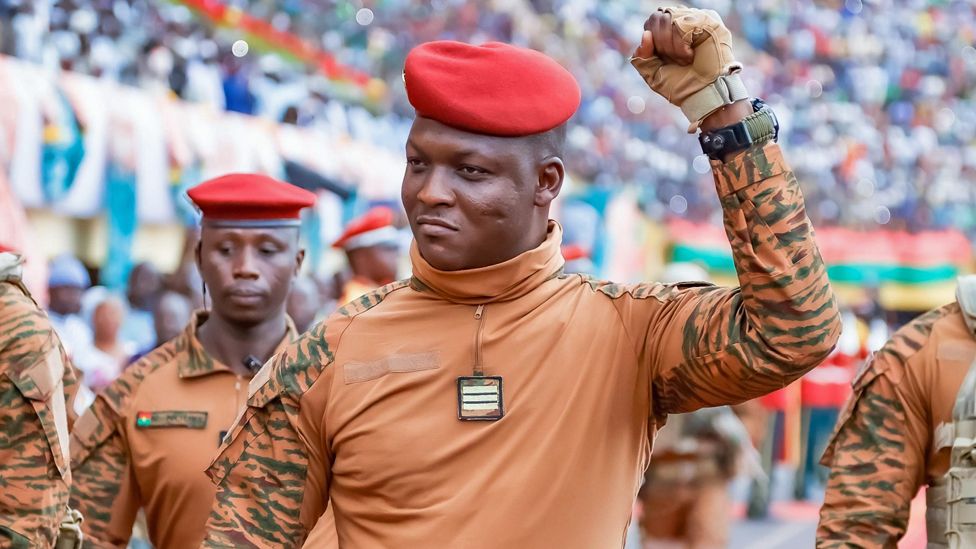Capt Ibrahim Traoré: The Rising Star of Burkina Faso’s Leadership
May 11, 2025 — Captain Ibrahim Traoré, at just 37, has emerged as a charismatic military leader in Burkina Faso, skillfully crafting an identity as a pan-Africanist champion who seeks to liberate his country from Western imperialism and neo-colonialism. His revolution-driven narrative has gained immense traction not only in Africa but globally, with supporters often likening him to the iconic Thomas Sankara, a former Burkinabé leader praised for his Marxist ideology and revolutionary zeal.
“Traoré’s influence is significant. Politicians and intellectuals from various African nations, including Kenya, openly express their admiration for him,” stated Beverly Ochieng, a senior researcher at Control Risks, in an interview with the BBC. “His rhetoric resonates in a time when many Africans are reevaluating their ties with the West while confronting persistent poverty despite the continent’s rich resources.”
Change in Foreign Relations and Economic Policies
Since his rise to power following a coup in 2022, Traoré has pivoted Burkina Faso away from its historical ties with France, forging a partnership with Russia that includes military assistance and a shift toward leftist economic policies. The junta has launched initiatives like a state-owned mining corporation, mandating that foreign companies cede a 15% stake in their local ventures while also ensuring skill transfers to Burkinabé nationals.
For instance, the Russian mining firm Nordgold recently obtained a license for a new gold investment in Burkina Faso, illustrating the junta’s commitment to capitalizing on the nation’s mineral resources. In a historic move, the government is working on constructing a gold refinery and establishing national reserves to optimize exploitation of its mineral wealth.
However, these seismic shifts spell trouble for Western-owned enterprises. Sarama Resources, an Australian company, has reported disputes with the government over the withdrawal of exploration licenses, while two gold mines have been nationalized from a London-listed firm, illustrating the junta’s aggressive nationalistic policies.
Popularity and Social Media Campaigns
Traoré’s radical reforms have not just garnered local support but have also made him arguably the most embraced leader across Africa today, according to Enoch Randy Aikins, a researcher at the Institute for Security Studies in South Africa. “His popularity is notably buoyed by social media, where misleading posts have bolstered his image as a revolutionary,” Aikins noted. AI-generated music tributes featuring global stars are also circulating, inadvertently preserving his narrative.
The turning point for Traoré’s recognition came during the Russia-Africa summit in 2023, where he urged fellow leaders to break free from Western influence. This address marked the beginning of his rise as a pan-African symbol, further cemented by public appearances and commemorative events in Russia that expanded his allure among populations affected by historical oppression.
Challenges and Criticism
Despite his rising popularity, Traoré faces criticism, including dismissals from figures like French President Emmanuel Macron, who has characterized him as the face of a “baroque alliance” between neo-imperialists and self-styled pan-African leaders. Additionally, some of his promises, particularly to eliminate a decade-long Islamic insurgency, remain unfulfilled, casting shadows on his leadership.
Moreover, under his rule, dissent has faced severe crackdowns, with opposition figures, journalists, and members of civil society subjected to harsh treatments amidst ongoing security strife.
| Indicators | Status in 2025 |
|---|---|
| Economic Growth | Projected to remain robust |
| Inflation Rate | Increased to 4.2% |
| Extreme Poverty Rate | Decreased to 24.9% |
| Nationalization of Mines | Several foreign-owned mines nationalized |
As Capt Traoré continues to inspire hope among the young populace of Burkina Faso, he must navigate the complexities of leadership in a region grappling with issues of governance, security, and historical grievances. The journey ahead for him and his revolutionary ambitions remains uncertain but highlights the shifting tides of political sentiment across Africa.


